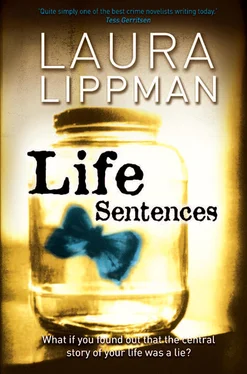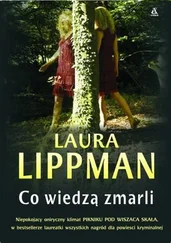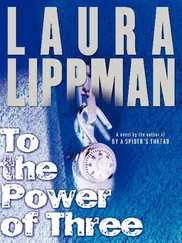Teena lifted the box of wine from her trunk, favoring her right hand, and cradled it on the point of her hip, the way a woman might carry a baby. She would eat something—a frozen dinner from Trader Joe’s, soup and a sandwich—forestall the first glass of wine just long enough to prove that she could. She would wash her dishes, tidy up the kitchen. Then, and only then, she would board the train for Banrock Station, chugging past all the other little towns on the route, all the places she would never know or visit.
‘The Elizabeth Perlstein Library will go here, and the old library will be converted into more classroom space, which we can definitely use.’
Cassandra studied the blueprints with pretend interest. She was not very good at conceptualization and could not envision the future building. But the headmaster—a new one, his name quite gone from her head—was clearly excited about the addition to what had always been, frankly, a grotty little campus, one of Baltimore’s second-tier private schools, for those keeping score. Many were, as it turned out. Old-line Baltimoreans were geniuses at working a mention of Gilman, Friends, Bryn Mawr, Roland Park Country, Park School, even Boys’ Latin into some not really relevant anecdote. Some expressed surprise that the Gordon School was still around, assuming it had collapsed into the ashes of its own hippy-dippy good intentions. The school, however, had never been the Harrad Experiment /free love fiasco that was enshrined in the public imagination. It had been intellectually rigorous, owing as much to English boarding schools and St John’s College’s classics-based curriculum as it did to the open-space experiment. The famed liberality had been confined to its lack of a dress code and its no-grades policy, which had included creating essentially fake records for colleges. Gordon School had done extraordinarily well at placing its students before that latter practice was uncovered and outlawed. Luckily, Cassandra had already graduated from Princeton by then.
Whatever its flaws, the Gordon School had employed her uncredentialed mother as a lower-school math teacher. More crucially, it had offered Cassandra a scholarship for her last three years of high school. The combination of touchy-feely culture and exacting intellectual standards, but with no competition, had been perfect for a student of her temperament. She was genuinely thrilled for the chance to help the school now.
She was less happy about the ceaseless pressure to contribute more of her own money to the project. It was funny how wildly others misjudged her income. Most people thought she had much less than she did, because it was inconceivable to them that a writer could make money. But some, like the headmaster here at the Gordon School, had erred in the other direction, suggesting she might want to give at the ‘Diamond’ level, which started— started —at $100,000. God knows what kind of money was required to put one’s name on a building; Elizabeth Perlstein, class of ’88, was either one of those tech billionaires or married to one. Luckily, Cassandra had mastered the art of the graceful demurral, the ability to avoid the definitive no while never saying yes. Instead, she had waived her speaking fee, which was considerable, and persuaded her father to join her on the stage here for a fund-raiser, in which she would lead him, for the first time ever, through a public discussion of what had happened to him in the ’68 riots. Tickets to the talk alone were $50 and there was a private dinner for those willing to pay $250. The school stood to raise almost $50,000 from the event. Not Diamond level, but Platinum, and more than good enough by Cassandra’s estimation.
‘We feel so lucky to have you,’ the headmaster said. ‘We thought the University of Baltimore symposium would have snapped you up.’
‘Oh, this is so much more meaningful to me,’ Cassandra said. The fact was, the University of Baltimore had not even contacted her, nor had they asked her father to contribute an oral history to its extensive Web-based archive. She had been hurt by this omission, but not surprised, for there had been a small backlash against My Father’s Daughter once it found commercial success. The critical talking point, first advanced by a so-so lesbian African-American novelist, was that Cassandra had usurped a major political event and turned it into—she knew the words by heart—a story about a white girl’s birthday party, ruined by the assassination of Dr Martin Luther King, wah-wah-wah. The words had rankled, but Cassandra hadn’t been foolish enough to respond. Still, in quiet moments, when that stinging criticism came back to her, she argued in her head with her nemesis, a one-book wonder rumored to owe at least three books to three different publishers. Don’t write me out of history. You, of all people, should know what it’s like to be silenced, to be told that you have no role—because of race, because of gender, because of sexuality. My story is my story. And my father—complicated, less than admirable man that he was—saved a woman’s life that day . Yes, her pillow had received those words many times over.
But this was only the fortieth anniversary. Perhaps by the fiftieth, they would be included. Fifty, ten years from now . Caught off guard by the realization that she was now at an age where, actuarially, she could not presume her father would be with her ten years in the future, Cassandra missed some point the headmaster was making. She smiled and nodded. Smiles and nods covered a multitude of oversights.
‘Pedant,’ Ric Fallows said a few hours later, after listening to her account of the meeting.
It was one of his favorite words, his all-purpose condemnation. Pedant, pedantic, pedantry, pederast , the last of which he seemed to use interchangeably with pedant , although he clearly knew better. The irony, of course, was that Cedric Fallows was far more pedantic, in the literal sense of the word, than those he labeled.
The pedant of the day was a neighbor here at Broadmead who had the temerity to complain about Mr Fallows sitting on his patio in his bathrobe. And nothing else. Given the retirement community’s village-like aspect, with garden apartments built around shared courtyards, he could be glimpsed by his neighbors in deshabille.
‘Only if they’re looking,’ he pointed out when Cassandra raised the issue.
‘Well,’ Cassandra said, ‘apparently they are. And they can live with the bathrobe. Just not the lack of anything beneath.’
‘That was last summer. Why bring it up now?’
‘Because spring is icumen in,’ she trilled. ‘ Lhude sang the cuccu in his bathrobe.’
He smiled. ‘It’s summer that’s icumen in. And your Middle English is deplorable.’
But she had played his game, used a learned reference to lighten a tense moment. She could let the subject drop, move on to a discussion of their upcoming appearance at the Gordon School.
‘I’m not sure I want to go,’ he said, surprising her. She thought her father would be dying for this bit of recognition. He had never had the academic career he envisioned, never published the big book in his head, the one he thought would change the way people read myths. ‘Fuck Joseph Campbell,’ he blurted out from time to time. Cassandra still wasn’t sure if he saw Campbell as the usurper of his ideas or the antithesis of what he had hoped to say.
‘We’re committed,’ she said nervously, thinking of those blueprints, the advance ticket sales. ‘They’ve advertised—’
‘Oh, I’ll be there, if I must. But why can’t you tell it, as you did in your book?’
Читать дальше












